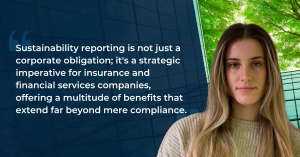Enhanced Risk Management
Sustainability reporting helps identify and manage ESG-related risks, reducing vulnerabilities to reputational damage, operational disruptions, and regulatory penalties.

Sustainability has emerged as a paramount concern for insurance and financial services companies. Beyond mere corporate responsibility, sustainability now holds the key to mitigating risks and satisfying the ever-heightening expectations of stakeholders. At the heart of this commitment to Environmental, Social, and Governance (ESG) principles lies the practice of sustainability reporting—an essential tool for modern businesses seeking to make their mark in a responsible, ethical, and transparent manner.

020 3946 2880


In today's challenging job market, still in the midst of the Great Resignation, every industry is facing recruitment challenges and struggling to attract young talent. But for the insurance sector, these challenges are more acute than most, and they're nothing new. But why are the younger generations not being attracted to the insurance sector? There are a number of reasons for this...

Amidst a time where underrepresentation and inequality are rife within the workplace, how does the insurance sector not only champion inclusivity, but also succeed in female retention?

The growth of B2B SaaS products over the past decade has been nothing short of remarkable. With the advent of cloud computing, businesses have witnessed a transformative shift in how they procure and utilise software solutions. This shift has been fuelled by the undeniable advantages that B2B SaaS offers: scalability, cost-effectiveness, and accessibility, just to name a few...

What a year. When the idea sprung to me to write a blog about my experience as a Marketing Intern over the last year, I thought it would be a perfect opportunity for self-reflection. To kind of close this chapter of my life. But to be honest, it's hard to know where to start...

Choose a time to suit you and meet one of our experts